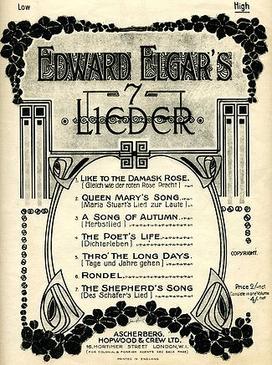Related Research Articles
Sea Pictures, Op. 37 is a song cycle by Sir Edward Elgar consisting of five songs written by various poets. It was set for contralto and orchestra, though a distinct version for piano was often performed by Elgar. Many mezzo-sopranos have sung the piece.
"Jesu, Joy of Man's Desiring" is the popular English title of the chorale from the 1723 Advent cantata Herz und Mund und Tat und Leben, BWV 147, by Johann Sebastian Bach. The chorale occurs twice in the cantata, with different texts each time : as its sixth movement, Wohl mir, dass ich Jesum habe, and again as its tenth movement, Jesus bleibet meine Freude. The English title derives from famous piano transcriptions made by Myra Hess, in 1926 for piano solo and in 1934 for piano duet, as published by Oxford University Press. Whether played instrumentally or sung in German or English, the chorale is often heard at weddings and during Advent, Christmas, and Easter.

The Window; or, The Songs of the Wrens is a song cycle by Arthur Sullivan with words by Alfred, Lord Tennyson. Written in 1867–1870, it was eventually published in 1871. There are multiple versions of the title: On the cover of the 1871 edition, the subtitle is given as "The Loves of the Wrens", however, "Songs of the Wrens" is used on the frontispiece and is the one generally used.
"Pleading" is a poem written by Arthur L. Salmon, and set to music by the English composer Edward Elgar in 1908, as his Op.48.
Twilight is a song with music by the English composer Edward Elgar written in 1910 as his Op. 59, No. 6. Elgar set the words of the poem The Twilight of Love, from Volume 2 of a series of poems called Embers by Sir Gilbert Parker. The Opus 59 songs were part of a song-cycle of six romantic songs by Parker that was never completed – Nos 1, 2 and 4 were never composed. The other songs were Oh, soft was the song and Was it some Golden Star?. The songs were originally written with piano accompaniment, but this was later re-scored by the composer for full orchestra.
Oh, soft was the song is a song with words by Gilbert Parker set to music by the English composer Edward Elgar in 1910, as his Op. 59, No. 3. It is the second and last verse of a poem At Sea which Parker published in Volume I of a series of poems called Embers. The Opus 59 songs were part of a song-cycle of six romantic songs by Parker that was never completed – Nos 1, 2 and 4 were never composed. The other songs were Was it some Golden Star? and Twilight. The songs were originally written with piano accompaniment, but this was later re-scored by the composer for full orchestra.
"A Song of Autumn" is a poem by Adam Lindsay Gordon set to music by Edward Elgar in 1892.

In the Dawn is a song written by the English composer Edward Elgar in 1901 as his Op.41, No.1.

Speak, Music! is a song written by the English composer Edward Elgar in 1901 as his Op.41, No.2.

The Torch is a song written by the English composer Edward Elgar in 1909 as his Op.60, No.1.

"Is she not passing fair?" is a song written by the English composer Edward Elgar.
”Through the Long Days” is a song written by the English composer Edward Elgar in 1885 as No. 2 of his Op. 16, Three Songs. The words are from a poem by the American writer and statesman John Hay.
"Rondel" is a song written by the English composer Edward Elgar in 1894 as his Op. 16, No. 3. The words are by Longfellow, a translation of a Rondel by Froissart. The manuscript is dated 4 January 1894.

”Always and Everywhere” is a song by the English composer Edward Elgar with words translated from the Polish of Zygmunt Krasiński by Frank H. Fortey. It was composed and published in 1901.

”Inside the Bar" is a song written in 1917 by the English composer Edward Elgar, with words by Sir Gilbert Parker.
”XTC” ("Ecstasy") is a song with words and music written by the English composer Edward Elgar in 1930. It was his last song, and written for the soprano Joan Elwes.

Seven Lieder is a set of songs by the English composer Edward Elgar published together in 1907, by Ascherberg, Hopwood & Crew Ltd.

"In Moonlight" is a song with music written by the English composer Edward Elgar in 1904 to words from the poem "An Ariette for Music. To a Lady singing to her Accompaniment on the Guitar", by Percy Bysshe Shelley (1792-1822) and published in 1832.

Caroline Alice, Lady Elgar was an English author of verse and prose fiction, who married the composer Edward Elgar.
Elisabeth Wintzer was a German composer and writer.
References
- ↑ Tennyson, Lord Alfred (1875). Queen Mary: a Drama. Boston: J. R. Osgood.
- ↑ Percy M. Young (1955). Elgar O. M. London: Collins OCLC 869820
- ↑ James Leonard. Songs & Piano Music by Edward Elgar at AllMusic
- ↑ "Elgar CDs Part-songs and solo songs". Archived from the original on 21 November 2008. Retrieved 26 August 2024.
- ↑ "CD Information - the songs of Edward Elgar".
- ↑ Incidental music to Queen Mary (Stanford) : Scores at the International Music Score Library Project
- ↑ "Queen Mary's Song" (Loder) : Scores at the International Music Score Library Project